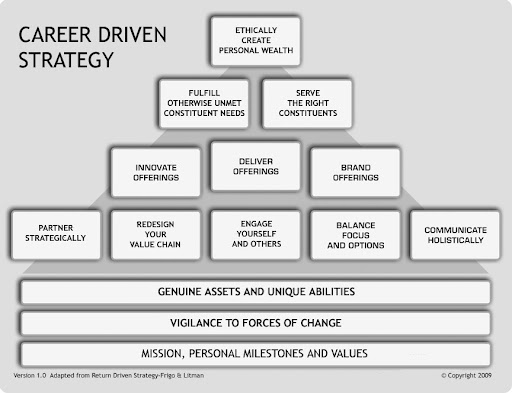Think you're being outsmarted by AI? Not if you read this first!
|
|
| Want to know more about today’s topic? Keep reading below! Think you're being outsmarted by AI? Not if you read this first! Do you believe that it’s not the strongest who survive upheaval, but those who adapt fastest? After all, history doesn’t favor the hesitant. Whether it was the Internet boom of the ‘90s, the smartphone shift of the 2000s, or cloud computing in the 2010s, technological revolutions have always crowned a new generation of winners. Now, in the artificial intelligence (AI) era, the question isn’t if disruption is coming, but who is going to benefit from it the most. … and according to Professor Joel Litman , Chairman and CEO of Valens Research and Chief Investment Officer of Altimetry Financial Research, one thing is clear: AI won’t take your job. However, someone who understands how to use it better than you just might.
Is AI really a threat? Navigating this new digital frontier, Professor Litman pulls no punches. He says there’s a fundamental misconception in the market right now, as too many fear that AI will replace them in their jobs. That’s why Professor Litman clarifies: “AI itself isn’t going to take your job. It’s someone using AI better than you who will.” That distinction matters—especially for professionals in finance and investing, where decision-making, speed, and data mastery define winners and losers. Companies and individuals that proactively integrate AI into their processes are already accelerating. Those waiting on the sidelines? They’re falling behind, fast. Besides, the path to long-term growth isn’t just having AI; it’s understanding how to use the right tools, powered by the right data, for the right problems. Additionally, Professor Litman drives home a critical insight: Effective AI integration isn’t about relying on a single platform like ChatGPT or Gemini for everything. Different AI models are built for different strengths, and assuming one can do it all is a strategic misstep. For instance: At Valens Research, Professor Litman has mandated that employees engage with AI tools at least 20 times a day. However, he warns that falling into the comfort zone of a one-size-fits-all assistant is a recipe for mediocrity. He also shares a real-world example from his own work in relation to analyzing management’s tone and intent during earnings calls. For this task, Professor Litman and his team uses a specialized AI assistant fine-tuned to detect subtle cues and “poker tells” in executive communication. … but when it comes to dissecting massive financial datasets—20,000 companies, hundreds of variables—an entirely different AI tool takes the lead. That tool, while not perfect, produces powerful insights in seconds that used to take hours, if not days. Another often-overlooked factor in successful AI use is the quality of input data. Professor Litman references a timeless principle from IBM ’s George Fuechsel: “Garbage In, Garbage Out.” This means no matter how sophisticated the algorithm, feeding it flawed, shallow, or misaligned data will result in equally flawed outputs. This is particularly evident in Valens’ proprietary Earnings Call Forensics (ECF) analyzer. Preparing earnings call data for AI analysis takes eight times longer than the analysis itself. Why? That’s because audio recordings often don’t match published transcripts! Swear words are redacted. Emotional tones are missed. Even basic facts are misrepresented in cleaned-up reports. For Professor Litman, every expletive matters—especially if it came from a CEO under pressure. In his words: “If a CEO swears during an earnings call, I want to know about it.” That raw emotion is gold for the ECF tool, revealing stress signals, discomfort, or hidden confidence that the average transcript would scrub away. — Ultimately, the true competitive edge isn’t AI itself—it’s how well firms structure their data, how intentionally they deploy tools, and how willing they are to continuously learn and adapt. Professor Litman draws a parallel with the PC revolution of the 1990s. The companies that embraced personal computers with clarity and long-term vision didn’t just survive; they also dominated. Now, the stakes are even higher. The pace is faster… and the potential gap between winners and losers? Wider than ever! While some firms build flashy AI tools to appease shareholders, Professor Litman warns that long-term results will expose who’s just putting on a show and who’s truly engineering value. For this reason, investors must take note: The real winners will be the ones asking why they’re using AI, not just how. After all, those who adapt early—and intelligently—reap the BIGGEST rewards. Hope you’ve found this week’s insights interesting and helpful. Stay tuned for next Wednesday’s The Independent Investor! Layoffs have been widespread throughout the tech industry so far in 2025. Learn more about why investors shouldn’t fear AI-related layoffs in next week’s article! |

Miles Everson
CEO of MBO Partners and former Global Advisory and Consulting CEO at PwC, Everson has worked with many of the world's largest and most prominent organizations, specializing in executive management. He helps companies balance growth, reduce risk, maximize return, and excel in strategic business priorities.
He is a sought-after public speaker and contributor and has been a case study for success from Harvard Business School.
Everson is a Certified Public Accountant, a member of the American Institute of Certified Public Accountants and Minnesota Society of Certified Public Accountants. He graduated from St. Cloud State University with a B.S. in Accounting.




